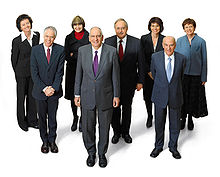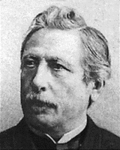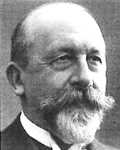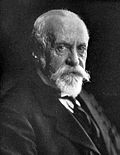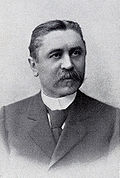- Demographics of the Swiss Federal Council
-
The tables below show information and statistics about the members of the Swiss Federal Council (in German: Bundesrat, in French: conseil fédéral, in Italian: consiglio federale), or Federal Councilors (in German: Bundesräte, in French: conseillers fédéraux, in Italian: consiglieri federali).
The Swiss Federal Council (German: Schweizerischer Bundesrat, French: Conseil fédéral suisse, Italian: Consiglio federale svizzero, Romansh: Cussegl federal svizzer) is the seven-member executive council which constitutes the government as well as the head of state of Switzerland. Each of the seven Federal Councillors heads a department of the Swiss federal government. The members of the Federal Council are elected for a term of four years by both chambers of the federal parliament sitting together as the Federal Assembly. Each Councillor is elected individually by secret ballot by an absolute majority of votes. Since 1848, the seven Councellors have never been replaced simultaneously, thus guaranteeing a continuity of the government.
Once elected for a four-year-term, Federal Councillors can neither be voted out of office by a motion of no confidence nor can they be impeached. Reelection is possible for an indefinite number of terms, and it has historically been extremely rare for Parliament not to reelect a sitting Councillor and this has only happened four times. In practice, therefore, Councillors serve until they decide to resign and retire to private life, usually after three to five terms of office.
Contents
Parties
Parties Members FDP/PRD (Freisinnige, parti radical) 67 LPS/PLS 1 CVP/PDC (formerly KVP) 20 SVP/UDC (formerly BGB/PAI) 10 SPS/PSS 12 Time in office
The following tables do not include councilors currently in office.
Longest Time in Office Years Name Term 31 Karl Schenk 1863–1895 29 Adolf Deucher 1883–1912 28 Giuseppe Motta 1911–1940 27 Wilhelm Matthias Naeff 1848–1875 25 Emil Welti 1866–1891 Philipp Etter 1934–1959 24 Eduard Müller 1895–1919 22 Edmund Schulthess 1912–1935 20 Melchior Josef Martin Knüsel 1855–1875 Shortest Time in Office Years Name Term 1 Louis Perrier 1912–1913 Rudolf Friedrich 1982–1984 2 Gustave Ador 1917–1919 Jean Bourgknecht 1959–1962 Max Weber 1951–1954 Victor Ruffy 1867–1869 3 Eugène Borel 1872–1875 Joachim Heer 1875–1878 Josef Anton Schobinger 1908–1911 4 Christoph Blocher 2003–2007 Alphons Egli 1983–1986 Elisabeth Kopp 1984–1989 Josef Escher 1950–1954 Ruth Metzler 1999–2003 5 Ernst Wetter 1938–1943 Fridolin Anderwert 1875–1880 Fritz Honegger 1977–1982 Giuseppe Lepori 1954–1959 Hermann Obrecht 1935–1940 Paul Cérésole 1870–1875 René Felber 1987–1993 Thomas Holenstein 1955–1959 Age (oldest and youngest)
Age when elected Age Name Elected 72 Gustave Ador 1917 65 Josef Escher 1950 63 Louis Perrier 1912 Christoph Blocher 2003 62 Ernest Chuard 1919 61 Ernst Wetter 1938 Hans Streuli 1953 Pierre Graber 1969 Hans-Rudolf Merz 2004 60 Fritz Honegger 1977 Johannes Baumann 1934 ... 39 Eugène Ruffy 1893 Jakob Dubs 1861 Marcel Pilet-Golaz 1928 38 Paul Cérésole 1870 37 Ulrich Ochsenbein 1848 36 Constant Fornerod 1855 Eugène Borel 1872 35 Ruth Metzler 1999 34 Jakob Stämpfli 1854 31 Numa Droz 1875 Age when resigning/dying in office Age Name Year 81 Adolf Deucher 1912 74 Gustave Ador 1919 73 Joseph Zemp 1908 Wilhelm Matthias Naeff 1875 72 Ludwig Forrer 1917 71 Karl Schenk 1895 Ernest Chuard 1928 70 Eduard Müller 1919 Eduard von Steiger 1951 ... 50 Adrien Lachenal 1899 49 Jakob Dubs 1872 48 Constant Fornerod 1867 Numa Droz 1892 46 Victor Ruffy 1869 43 Jakob Stämpfli 1863 Paul Cérésole 1875 Ulrich Ochsenbein 1854 40 Eugène Borel 1875 39 Ruth Metzler 2004 Lifespan
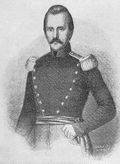 Ochsenbein lived for 36 years after being voted out of office
Ochsenbein lived for 36 years after being voted out of office
Years alive after resigning from office Years Name Died 36 Ulrich Ochsenbein 1890 35 Hans Schaffner 2004 33 Max Petitpierre 1994 32 Constant Fornerod 1899 Felix-Louis Calonder 1952 30 Enrico Celio 1980 Paul Cérésole 1905 29 Hans-Peter Tschudi 2002 26 Rudolf Friedrich Living 25 Emil Frey 1922 Pierre Graber 2003 24 Alphons Egli Living 23 Pierre Aubert Living Leon Schlumpf Living 22 Nello Celio 1995 Elisabeth Kopp Living Longest living members of the Swiss Federal Council Age Name Died 95 Hans Schaffner 2004 Max Petitpierre 1994 94 Pierre Graber 2003 90 Enrico Celio 1980 88 Felix-Louis Calonder 1952 Hans-Peter Tschudi 2002 Willy Spühler 1990 Rudolf Friedrich Living 87 Georges-André Chevallaz 2002 86 Friedrich Traugott Wahlen 1985 Philipp Etter 1977 Alphons Egli Living Leon Schlumpf Living References
- Federal Council in German, French and Italian in the online Historical Dictionary of Switzerland.
- The Swiss Confederation: A brief guide 2006, edited by the Swiss Federal Chancellery.
- Resultate der Wahlen des Bundesrats, der Bundeskanzler und des GeneralsPDF, compiled by the services of the Swiss Parliament.
- Clive H. Church (2004). The Politics and Government of Switzerland. Palgrave Macmillan. ISBN 0-333-69277-2.
External links
- Chronological index of Federal Councillors, on the official website of the Swiss Federal Council.
Swiss Federal Council Current members Micheline Calmy-Rey (Pres. 2011) · Doris Leuthard · Eveline Widmer-Schlumpf (VP 2011) · Ueli Maurer · Didier Burkhalter · Simonetta Sommaruga · Johann Schneider-Ammann
About Composition ("Magic formula") · DemographicsLists of members Lists by department Categories:- Members of the Swiss Federal Council
- Lists of political office-holders by age
- Lists of people by time in office
- Switzerland-related lists
Wikimedia Foundation. 2010.

